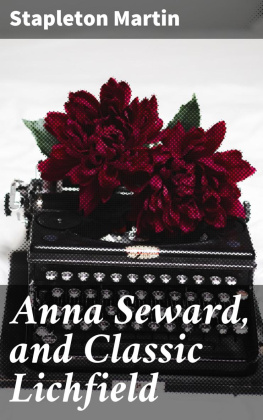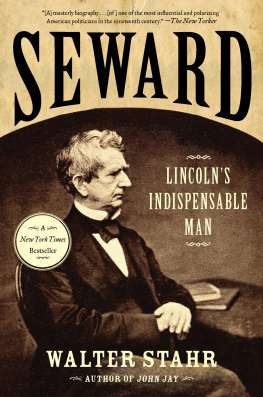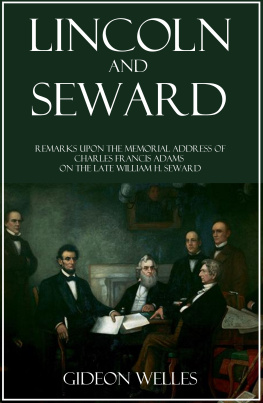ANNA SEWARD
Table of Contents
Anna Seward, a daughter of the Rev. Thomas Seward, destined to become, by universal assent, the first poetess of her day in England, was born 12th December, 1747. Her mother was Elizabeth, one of the three daughters of the Rev. John Hunter (who was in 1704 appointed Head Master of Lichfield Grammar School), by his first wife, Miss Norton, a daughter of Edward Norton, of Warwick, and sister of the Rev. Thomas Norton, of Warwick. Anna Sewards parents were married at Newton Regis Church, Warwickshire, in October, 1741. The poetess was born at Eyam in Derbyshire, where her father was then the Rector. She was baptized Anne, but she generally wrote her name Anna. Her pet name in her own family was Nancy, and also often Julia.
Mr. Seward attained some literary fame, and was co-adjutor to an edition of the works of Beaumont and Fletcher. When Anna Seward was seven years old, the family removed to Lichfield, and when she was thirteen they moved into the Bishops Palace, our pleasant home as she called it, where she continued to live after her fathers death, and for the remainder of her days.
The derivation of the word Lichfield has excited a good deal of controversy. In Anna Sewards time, it was generally thought to mean the field of dead bodies, cadaverum campusfrom a number of Christian bodies which lay massacred and unburied there, in the persecution raised by Diocletian. A reference to Notes and Queries, in the Sixth and Eighth Series, will show an inquirer that later search throws some doubt on such derivation. St. Chad, or Ceadda (669672) founded the diocese of Lichfield, and was its patron saint.
The Cathedral, the Venus of Gothic creation, as now existing, was built piecemeal during the 13th and early part of 14th centuries. The present Bishops Palace is of stone, and was erected in 1687, by Thomas Wood, who was Bishop from 1671 to 1692, on the site of the old palace, built by Bishop Walter de Langton (12961321). The Bishops of Lichfield had a palace at Eccleshall, and this was the one used by these dignitaries down to the time of Bishop George Augustus Selwyn, who, it may be mentioned, was born 5th April, 1809. The latter sold it, and with part of the net proceeds added two ugly wings and an ugly chapel to the palace when he came to dwell there, in order to make it a centre of religious activity in the diocese. The body of the palace is, however, to this day little changed from its state when inhabited by the Sewards.
Anna Seward had several sisters, and one brother, all of whom died in infancy, except her second sister, Sarah. She, almost on the eve of marriage in her nineteenth year, to Mr. Porter, brother to Mrs. Lucy Porter of Lichfield, and son-in-law to Dr. Samuel Johnson, died in June, 1764. She is described as having been lovely.
A stanza in The Visions, an elegy, the first of the poems in Anna Sewards Poetical Works, having reference to the sad event, runs thus:
The bridal vestments waited to array,
In emblematic white, their duteous maid;
But neer for them arrived that festal day;
Their sweet, crushd lily low in earth is laid.
John Hunter was Samuel Johnsons schoolmaster, and Johnson declared that he was very severe, and wrong-headedly severe. He once said, My master whipt me very well. Without that, sir, I should have done nothing. Mrs. Hunter died in July, 1780, aged 66. She had been very beautiful, from all accounts, insomuch that Dr. Green, afterwards Bishop of Lincoln, and Dr. Newton, afterwards Bishop of Lichfield (the learned and lucky pair) were once, Anna Seward tells us, rivals in their attachment to her.
Miss Honora Sneyd was the youngest daughter of Edward Sneyd, who was the youngest son of Ralph Sneyd of Bishton, in Staffordshire. She was adopted by Mr. and Mrs. Seward and brought up by them as one of their own children.
Edward Sneyd was a Major of the Royal Horse Guards (blue), and became a widower early in life. The death of his wife was a great affliction, but his relations and friends, who were numerous, proved eager to take charge of his daughters. Nothing could have exceeded the kindness and care with which Mrs. Seward executed the trust that she had undertaken. Indeed, none could have singled out Honora from Mrs. Sewards own daughters by the light of anything in Mrs. Sewards treatment or conduct. Honora was very beautiful and accomplished, and had attracted many admirers, as well as lovers. Anna Seward relates a whimsical story of an oddity, an awkward pedantic youth, once resident for a little time at Lichfield, who, when asked how he liked Honora, replied, I could not have conceived that she had half the face she has, adding that Honora was finely rallied about this imputed plenitude of face. The oval elegance of its delicate and beauteous contour made the exclamation trebly absurd. But her first real lover was the ill-fated Major Andr. He first met Honora at Buxton, or Matlock, and, falling deeply in love with her, became a frequent visitor at the Palace. He writes, How am I honoured in Mr. and Mrs. Sewards attachment to me! An engagement followed, but the marriage was prohibited. The reason, it would seem, was that Andr had not sufficient means to support a wife. Andr wrote to Honora, But oh! my dear Honora! it is for thy sake only I wish for wealth, which wealth, indeed, he called vile trash in another of his letters.
The story of the young soldier is truly a sad one. In 1780, while serving in America, Andr was entrusted with secret negotiations for the betrayal of West Point to the British forces, but was captured by the Americans. In spite of his petition that General Washington would adapt the mode of death to his feelings as a man of honour, he was hanged as a spy at Tappan. General Washington was unable to listen to strong appeals for clemency, for, though commander of the American armies, his voice counted but one on the court martial. Andr was of French descent, and has been described as high-spirited, accomplished, affectionate and merry-hearted. Anna Seward tells us that he appeared to her to be dazzled by Honora, who estimated highly his talents; but the poetess adds that he did not possess the reasoning mind Honora required. In 1821 his body was, on the petition of the Duke of York, brought to England. The courtesy and good feeling, remarks Dean Stanley of the Americans, were remarkable. The bier was decorated with garlands and flowers, as it was transported to the ship. On arrival in England the remains were first deposited in the Islip Chapel, and subsequently buried in the nave of Westminster Abbey, where the funeral service was celebrated, and where a monument was erected to his memory.
Washington, Anna Seward records, did her the honour to charge his aide-de-camp to assure her that no circumstances of his life had given him so much pain as the necessary sacrifice of Andrs life.














